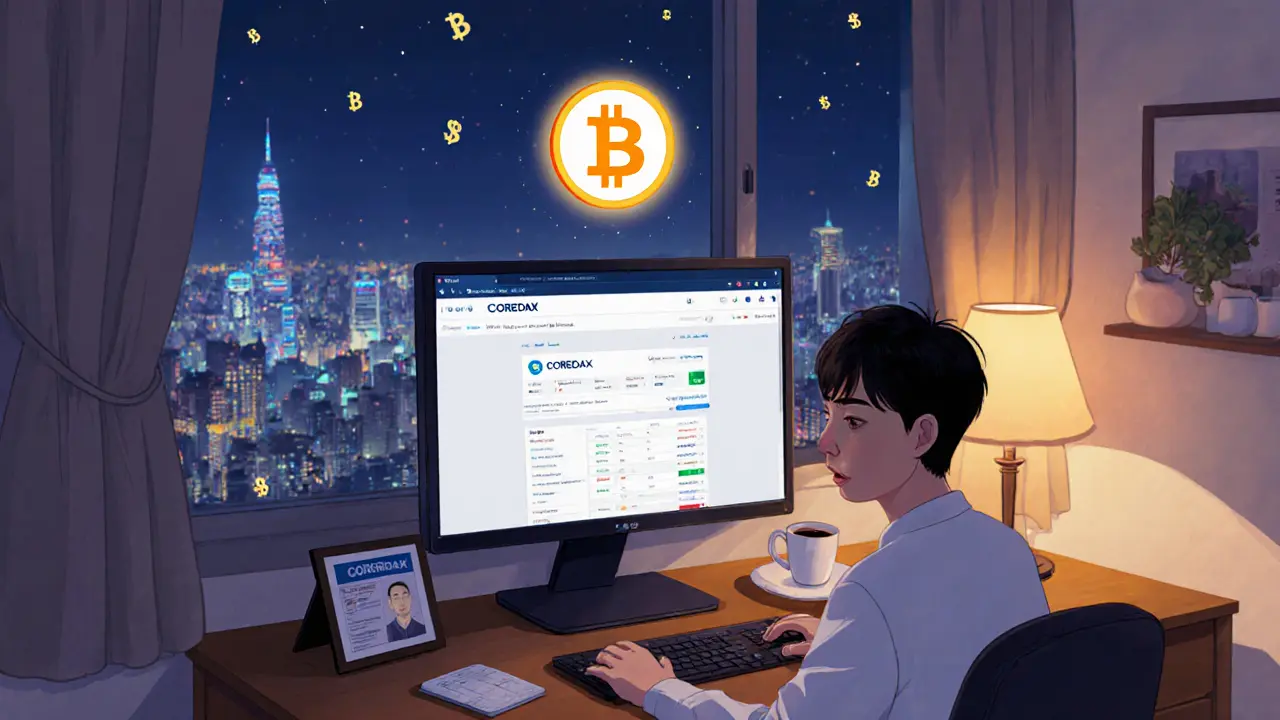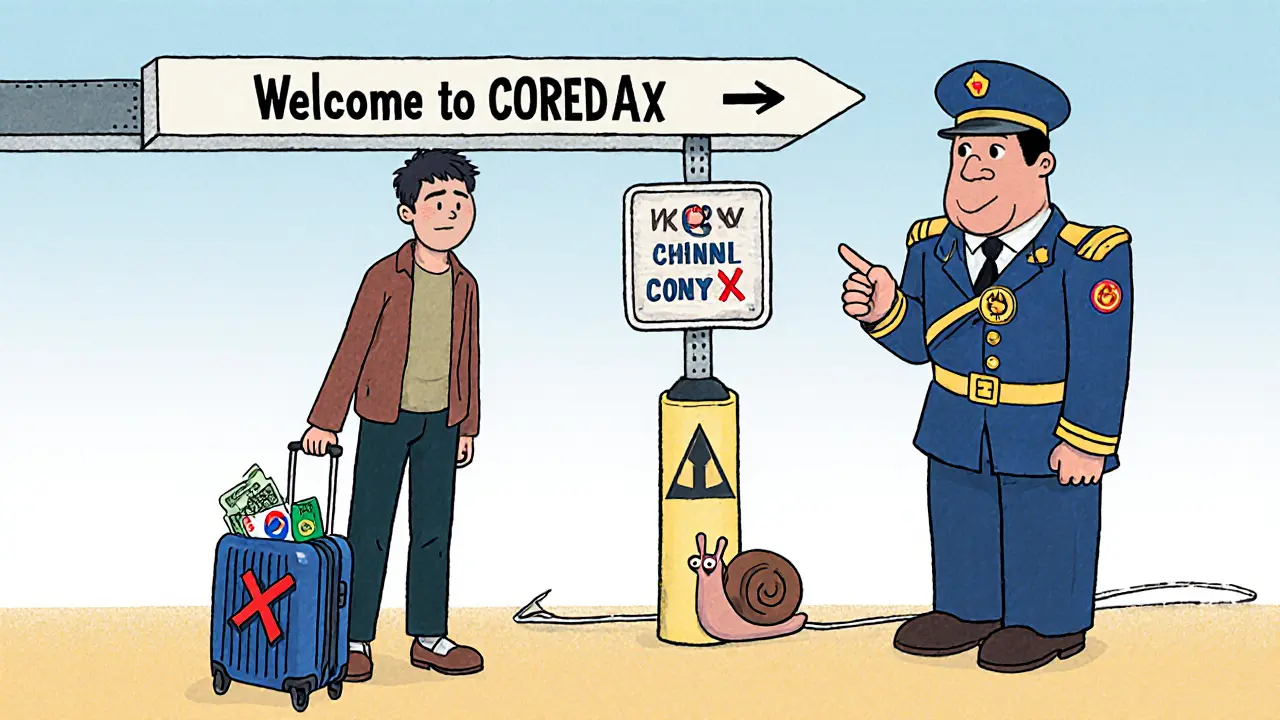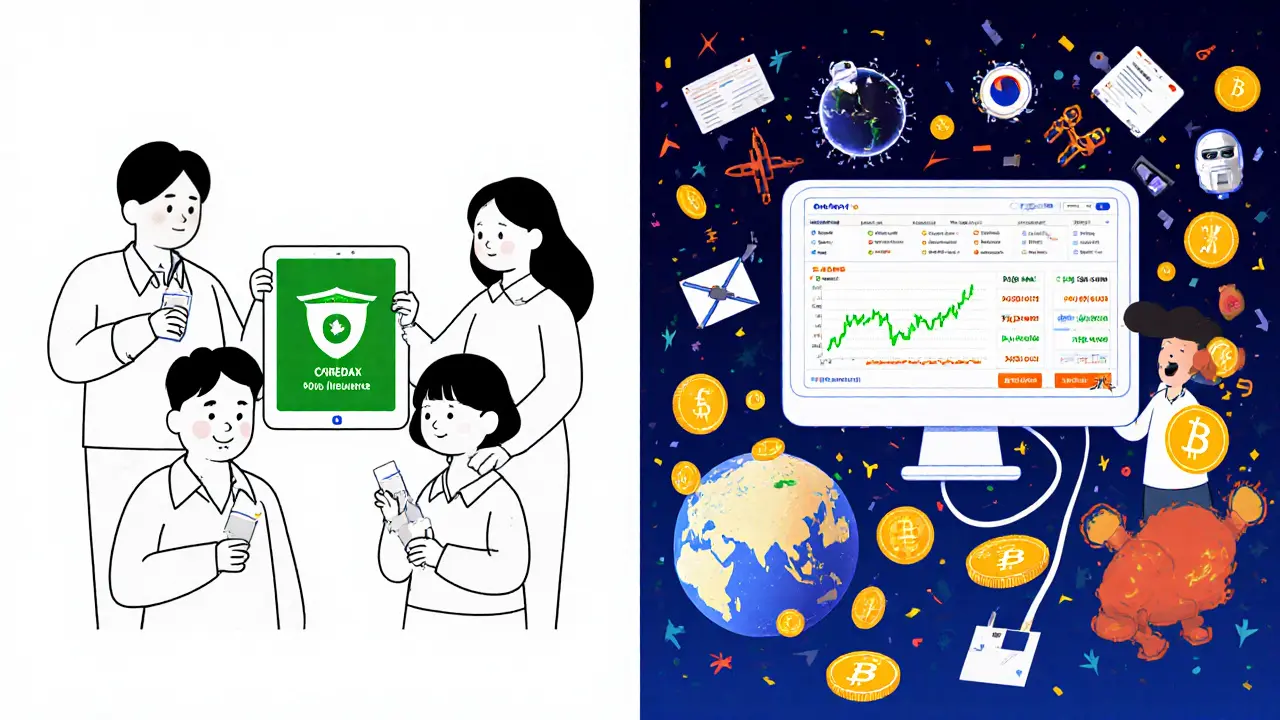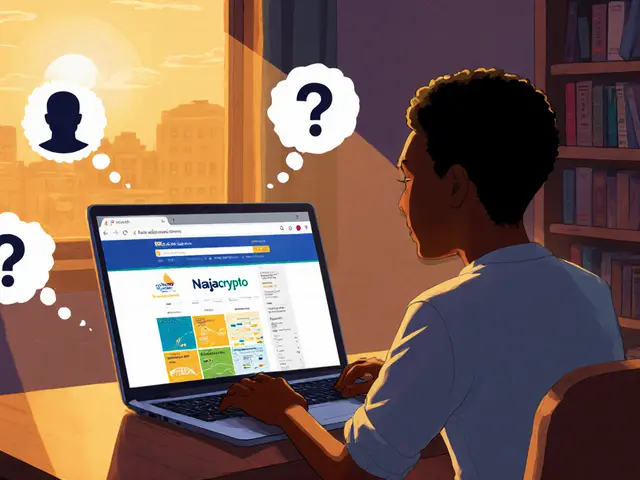
COREDAX User Eligibility Checker
Check Your COREDAX Eligibility
Based on your location, deposit method, language preference, and trading needs, we'll determine if COREDAX is suitable for you.
Check your eligibility first
Select your options above to see if COREDAX is right for you
COREDAX Crypto Exchange Review: Is It Right for You in 2025?
If you're looking for a crypto exchange that feels like it was built for Korean traders, COREDAX might be the one. But if you're outside South Korea or want to buy Bitcoin with your credit card, you'll hit walls fast. This isn't another global giant like Binance or Coinbase. COREDAX is a niche player - sharp in its home market, awkward everywhere else.
Launched in 2020, COREDAX didn't try to compete with the world. Instead, it focused on one thing: serving Korean retail investors under strict local laws. And that’s where it shines. If you live in Seoul, have a Korean ID, and want a regulated, no-nonsense platform, COREDAX works. But if you're in New Zealand, Canada, or Nigeria? You’ll be fighting the system just to sign up.
What Makes COREDAX Different?
COREDAX doesn’t offer 600 coins. It offers 47. That’s not a mistake - it’s strategy. The exchange lists only major coins like Bitcoin, Ethereum, and Solana, plus a handful of Korean blockchain projects. No random memecoins. No obscure tokens with no liquidity. This isn’t a gambling floor. It’s a trading floor for people who want stability.
What really sets COREDAX apart is its legal standing. It’s fully licensed under South Korea’s Virtual Asset User Protection Act, which came into force in July 2023. That means:
- Your funds are held in segregated accounts
- The exchange must prove it holds enough assets to cover all customer balances
- It carries insurance for 90% of customer deposits
- KYC checks are strict - no skipping them
This isn’t common everywhere. Many offshore exchanges operate in the gray zone. COREDAX doesn’t. That’s why Korean users trust it. In fact, it’s the 4th largest exchange in South Korea by volume, handling about 6.2% of the country’s $3.2 billion daily crypto trading.
Fees and Deposit Options: A Double-Edged Sword
COREDAX’s fee structure is simple but not always friendly. For Bitcoin withdrawals, you pay a flat 0.001 BTC per transaction. That’s higher than Binance (0.0005 BTC) and Upbit (0.0004 BTC). Not a deal-breaker if you’re trading large amounts, but annoying for small transfers.
Here’s the real problem: you can’t deposit with a credit card. Or PayPal. Or even a local e-wallet. The only way to put money in is through a Korean Won (KRW) bank wire transfer. Minimum deposit? ₩50,000 - about $38 USD. Sounds low, until you realize:
- International users must send money from a bank account in their own name
- Processing takes 1.8 business days on average
- Some banks block crypto-related transfers entirely
Compare that to Coinone or Upbit, which let you deposit via local bank apps in under an hour. COREDAX’s wire-only model is why it has a 34% lower new user conversion rate than competitors, according to Nomura Financial Insights.

Mobile and Desktop Apps: Built for Koreans, Not Global Users
The mobile app is clean. It works on iOS 14+ and Android 8+. You can log in with Face ID or fingerprint. Real-time charts, price alerts, and order history are all there. On Google Play, it has a 4.1/5 rating from over 1,200 reviews. But users complain about lag during market spikes - not surprising, since the servers are mostly in Seoul.
The desktop platform is more powerful. It supports Windows 10+ and macOS 11+, with a minimum screen resolution of 1366x768. But here’s the catch: everything is in Korean. The interface has partial English translations, but most menus, help guides, and error messages are only in Korean. If you don’t speak the language, you’re guessing your way through trades.
And forget about trading bots. COREDAX doesn’t publish API documentation. No webhook support. No developer portal. No GitHub repo. If you’re an algorithmic trader, this platform won’t help you.
Security: Regulated, But Not Transparent
COREDAX follows South Korea’s security rules - which are among the strictest in the world. That means cold storage for most assets, two-factor authentication, withdrawal whitelists, and IP restrictions. The Cloud Security Alliance’s guidelines say compliant exchanges should lock up 95%+ of funds offline. COREDAX likely does, but they won’t say for sure.
No public audit reports. No third-party penetration test results. No transparency page detailing security protocols. That’s not unusual for Korean exchanges - they’re not required to publish them. But it leaves international users uneasy.
And yes, North Korean hackers stole over $1.3 billion from exchanges in 2024. That’s a real threat. But COREDAX isn’t on Chainalysis’ list of breached platforms. No public incidents. No leaks. That’s good. But absence of evidence isn’t evidence of absence.

Who Is COREDAX For? Who Should Avoid It?
Use COREDAX if:
- You live in South Korea
- You have a Korean resident registration number
- You want a regulated, compliant exchange
- You’re okay with wire transfers and slow deposits
- You prefer a simple interface with fewer coins
Avoid COREDAX if:
- You’re outside Korea and don’t have a Korean bank account
- You want to buy crypto with a credit card
- You need 24/7 English customer support
- You trade with bots or advanced tools
- You want 200+ cryptocurrencies
International users often get rejected during KYC. The system asks for notarized translations of passports, and many applications fail because documents don’t match Korean formatting rules. One Reddit user in r/CryptoKorea said their application was denied because their passport photo was too bright. That’s not a glitch - it’s policy.
The Bottom Line: Niche, But Solid
COREDAX isn’t trying to be the biggest. It’s trying to be the safest - for Koreans. And in that goal, it succeeds. The exchange is stable, compliant, and focused. It doesn’t chase trends. It doesn’t list every new token. It doesn’t promise quick deposits. It just follows the law.
For Korean investors, that’s a win. For everyone else? It’s a dead end.
If you’re outside South Korea and want to trade crypto, look elsewhere. There are better options with faster deposits, wider coin lists, and real English support. But if you’re in Seoul, and you want to trade with confidence - COREDAX is one of the few exchanges you can actually trust.
Is COREDAX safe to use?
Yes, if you’re in South Korea. COREDAX is fully licensed under Korea’s Virtual Asset User Protection Act, which requires segregated customer funds, proof-of-reserves, and insurance coverage for 90% of deposits. It follows industry-standard security practices like cold storage and two-factor authentication. However, it doesn’t publish third-party audit reports, so you’re trusting their compliance rather than seeing proof.
Can I deposit USD or EUR on COREDAX?
No. COREDAX only accepts fiat deposits in Korean Won (KRW) via bank wire transfer. There’s no option for USD, EUR, or any other currency. International users must send KRW from a bank account in their own name, which can be difficult or impossible depending on your bank’s policies.
Does COREDAX support credit card payments?
No. COREDAX does not accept credit cards, debit cards, PayPal, or any e-wallets. The only way to add funds is through a Korean bank wire transfer. This is one of the biggest barriers for international users.
How many cryptocurrencies does COREDAX support?
COREDAX lists 47 cryptocurrencies as of September 2025. It focuses on major coins like Bitcoin, Ethereum, and Solana, plus a few Korean blockchain projects. It doesn’t list low-cap tokens or memecoins, which reduces risk but also limits trading options.
Is COREDAX good for beginners?
Only for Korean-speaking beginners. The interface is clean and straightforward, but almost all documentation, help guides, and customer support are in Korean. Non-Korean speakers will struggle to navigate the platform, understand fees, or fix issues. For English speakers, platforms like Coinbase or Kraken are far more beginner-friendly.
Does COREDAX have a mobile app?
Yes. COREDAX has a mobile app available on both the Apple App Store and Google Play. It supports biometric login, real-time price alerts, and order tracking. User ratings are 4.1/5 on Google Play, but some users report lag during high-volatility periods. The app is optimized for Korean users and lacks advanced features like trading bots or API access.
What are the withdrawal fees on COREDAX?
COREDAX charges a flat fee of 0.001 BTC for Bitcoin withdrawals. For other coins, fees vary by network. These fees are higher than Binance and Upbit but within the range of other Korean exchanges. There are no hidden fees for deposits or trading, but wire transfer fees from your bank may apply.
Can I use COREDAX if I’m not Korean?
Technically yes, but it’s difficult. You need a valid international passport and a notarized translation of it. Even then, 12.7% of international KYC applications are rejected due to document format mismatches. Customer support is slow for non-Korean speakers, and there’s no English-language help center. Most international users find it easier to use exchanges with global support.
21 Comments
Write a comment
More Articles

Naijacrypto Crypto Exchange Review: Is It Safe for Nigerian Traders?
A detailed 2025 review of Naijacrypto, highlighting missing licensing, security red flags, and safer Nigerian alternatives like Luno, Breet Wallet, and EasyEquities.


Rajesh pattnaik
November 24, 2025 AT 01:02I tried signing up from India and got rejected after uploading my passport. The system asked for a notarized translation in Korean. I don't even know where to get that. Why make it this hard for non-Koreans?